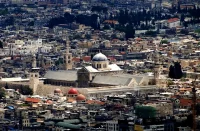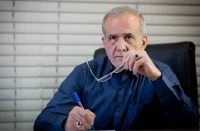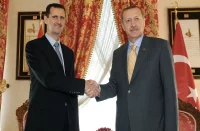Recently Iranian Revolutionary Guards posted a text on their website in favor of the country’s conducting a nuclear weapon test, the quintessential idea being that it would give the nation a renewed sense of might and dignity. While Tehran continues to deny that its nuclear program has a military dimension, several recent statements by Iranian officials give credence to the view that the publication actually reflects a wider and fully coherent policy. Last May the IAEA said Iran was installing equipment to measure the parameters of nuclear blasts performed at large distances or, possibly, deeply underground. The effort was added to the IAEA grievances list as another indication that the Iranian nuclear program is not fully civilian. In response, Iranian leader M. Ahmadinejad habitually charged the international nuclear watchdog’s chief Yu. Amano with discrediting his own agency by leveling allegations against Iran.
Shortly thereafter chief of Iran’s nuclear program F. Abbasi went public with a statement that the country would in the nearest future implement a serious upgrade of the equipment installed at its underground sites with the goal of enriching uranium faster and to higher grades than previously. There was a time when Iran claimed that its enrichment program was limited to producing nuclear power plant fuel. Over the past couple of years, however, the program started inching towards weapons-grade uranium output. According to Abbasi, Iran would raise the level of enrichment to 20% and the amount of enriched uranium produced – by a factor of 3. The UN Security Council has stamped three rounds of sanctions on Iran for refusing to scrap the enrichment program.
Producing weapons-grade uranium takes enrichment to 90%, but technologically the enrichment from 20% to 90% is a much shorter process than weapons-grade material production from low-grade substance.
Abbasi said new-generation centrifuges would be installed at the Fordo site in the proximity of Qom in central Iran. The site is known to be heavily fortified, immune to air attacks, and kept under tight security by the Revolutionary Guards. The existence of the Fordo site used to be Iran’s top secret, and Tehran admitted its existence only in September, 2009 as the Western intelligence services were about to make the information available to the public.
Iran took to enriching uranium to higher grades in February, 2010, citing the needs of a cancer treatment program. D. Albright from the Institute for Science and International Security regards Iran’s justification as a pretext and says that uranium of such grade is unnecessary for civilian purposes. D. Albright expressed – with a reference to Koran’s calls for getting armed to instil fear among the infidels – the view that the aforementioned paper posted on the Revolutionary Guards’ website is another reason to suspect that Iran is on the way to becoming a nuclear-armed country.
It does factor into the situation that buying new-generation centrifuges should be a problem for a country facing a hermetic embargo, and Iran’s ability to manufacture them domestically appears dubious to the majority of experts. On top of that, the West is using cyber-warfare to put obstacles in the way of Iran’s nuclear program: in a widely known recent incident, for example, the Stuxnet virus paralyzed the Iranian research computer networks and seriously slowed down the country’s nuclear program.
Most watchers believe that Tehran’s getting increasingly outspoken about the Iranian nuclear program is a tactic meant to get the world accustomed to the idea that Iran is going to eventually emerge as a nuclear-armed country. The Iranian TV reported that the country’s scientists are through with preparations for the creation of the novel centrifuges. In response, US National Security Council Spokesman T. Vietor said: “We are concerned with Iran’s announced intention to continue expanding its enrichment program in violation of Iran’s international obligations…This decision would involve Iran’s stockpiling of even more near-20 percent enriched uranium without a credible use for this material in the near term. We urge Iran to reconsider this decision, to comply with its international obligations without further delay.”.
Obviously, we are witnessing a new phase of the conflict between Iran and the West over the Iranian nuclear program. Iran switched to an assertive position and makes progress towards its goals defying the international pressure. At the moment Tehran’s determination to build nuclear weapons is barely disguised.
In the meantime, Russia is drifting towards the West over the Iranian nuclear program. Moscow is asking Tehran tough questions and talking to Iran in an increasingly unfriendly tone. It is likely that in the not-so-distant future Moscow’s voice will become completely indistinguishable from the Western chorus.
While asking Tehran tough questions is in any case a legitimate pursuit, the motivation of the Iranian leadership and the West’s position over the matter do deserve greater attention. As of today, the club of countries whose ownership of nuclear weapons is illegitimate is fairly large, Israel being the prime example. Yet, neither of the club’s member-countries ever came under as much pressure as Iran. Why is Iran held fully responsible for what others easily get away with?
The population of Iran doubled over the three decades since the Islamic Revolution in the country, with people under 25 comprising 75% of its population. The level of mass education in Iran is exceptional when seen against the overall background of the Middle East. Iran’s economy is in decent shape despite the lasting blockade. The country maintains developed systems of welfare, education, and medical care. It is no overstatement that Iran’s original model of democracy is time-tested and serves as a guarantee of the country’s economic health and sovereignty.
Proponents of globalization feel challenged by the fact that the revolution they inspired in 1979 somehow resulted in the establishment of an Islamic society invulnerable to external influences. In contrast to Pakistan, an illegally nuclear-armed country, Iran repels boldly and successfully any attempts to intervene into its domestic affairs and acts internationally as a stronghold of the anti-American Islam. The West is ready to besiege Iran under whatever pretext, and the country’s nuclear program, which was practically nonexistent or at least no match to Pakistan’s at the time clashes over it began is simply the number one pretext.
Tehran’s tendency to be the top proponent of the Muslims’ interests in the region adds an ideological dimension to its standoff with the West. The position automatically puts Iran in conflict with Israel. It is clear that due to the Nonproliferation Treaty Iran cannot be open about its nuclear ambitions, but Israel’s possession of nuclear weapons forces Tehran to seek a comparable status. Tehran can defend the rights of Palestinians and other Muslims only provided that it is not inferior to Israel militarily.
The standoff between Iran and Israel has long overgrown the regional scale and evolved into a conflict between Iran and the Western civilization. The West reasonably perceives Iran as an anti-globalist fortress in Asia. Tehran was quick to understand that an epoch of reliance on soft power wold follow the US withdrawal from Iraq and Afghanistan and that the “democratization” efforts would be focused onto Iran…
Russia should adopt a cautious approach under the circumstances. Iran is too important for Moscow to side without the due restraint with Washington over the Iranian nuclear program. Iran has good chances to establish itself as the most influential player in the region just south of Russia. In the foreseeable future, the tide of the US-driven globalization will reach Russia’s borders, and it will be making a great difference to Moscow whether its southern neighbor is a sovereign Muslim country or a one governed by a puppet pro-US regime…
Source: Strategic Culture Foundation














As a Muslim Canadian along with my Jewish Israel-British Jewish blogger Gilad Atzmon – also believe that Iran should acquire a nuclear bomb to shut-up Israel and its ZOG dogs among the nuclear powers.
However, the problem is the Spiritual Leader Ayatullah Khameini, who is also the Supreme commander of Iranian Armed forces – like Imam Khomeini, believes tha WMDs are against Islamic law and not be acquired are used against civilians.
The joke is while the US, France, Britain, Russia, China, India and Israel have over 23,000 nuclear bombs – the cowards are scared of the non-existent Islamic bomb in Iran.
http://rehmat1.wordpress.com/?s=iranian+nuclear+bomb
Our adversaries are not scared by the bombs. They are scared by sovereign powers beyond their reach. Bomb is only a pretext for political pressure.